Empiricism emphasizes knowledge derived from sensory experience and observation, forming the foundation of scientific inquiry and experimentation. This approach challenges theories based solely on intuition or speculation, promoting evidence-based understanding of the world. Explore the article to learn how empiricism shapes your critical thinking and decision-making processes.
Table of Comparison
| Aspect | Empiricism | Idealism |
|---|---|---|
| Definition | Knowledge originates from sensory experience. | Reality is fundamentally mental or spiritual. |
| Key Philosophers | John Locke, David Hume, George Berkeley | Plato, Immanuel Kant, G.W.F. Hegel |
| Epistemology | Empirical evidence via observation and experimentation. | Knowledge derives from innate ideas and mental constructs. |
| Metaphysics | Physical world is primary and accessible. | Mind or ideas constitute the ultimate reality. |
| Focus | Sensory perception and experience. | Mental phenomena and consciousness. |
| Criticism | Limits in explaining abstract concepts and innate knowledge. | Challenges in proving the existence of an external world. |
Introduction to Empiricism and Idealism
Empiricism emphasizes knowledge derived from sensory experience and evidence, asserting that observation is the foundation of understanding reality. Idealism posits that reality is fundamentally mental or immaterial, with ideas and consciousness shaping the nature of existence. These philosophical frameworks provide contrasting approaches to epistemology, where empiricism relies on empirical data, and idealism centers on the primacy of ideas and perception.
Historical Origins of Both Philosophies
Empiricism traces back to ancient Greek philosophers like Aristotle, emphasizing knowledge derived from sensory experience and observation as key to understanding reality. Idealism originated with Plato, who argued that reality consists of immaterial ideas or forms, asserting that knowledge is primarily gained through intellectual insight rather than sensory experience. The historical development of empiricism was significantly influenced by thinkers such as John Locke and David Hume during the Enlightenment, while figures like Immanuel Kant sought to reconcile elements of both philosophies in his critical philosophy.
Core Principles of Empiricism
Empiricism emphasizes knowledge derived from sensory experience, asserting that all ideas originate from external stimuli and observation. Key empiricist thinkers like John Locke and David Hume argue that the mind begins as a tabula rasa, acquiring knowledge through sensory information rather than innate ideas. This philosophy prioritizes empirical evidence and experimentation as the foundation for understanding reality, contrasting sharply with the innate concepts central to Idealism.
Fundamental Tenets of Idealism
Idealism asserts that reality is fundamentally shaped by the mind or spirit, emphasizing that ideas and consciousness constitute the essence of existence. It posits that material objects do not possess independent reality outside of perception, challenging the empirical reliance on sensory experience. Central to idealism is the belief that knowledge originates from innate ideas and rational insight rather than empirical observation.
Key Philosophers and Their Contributions
John Locke and David Hume are central figures in empiricism, emphasizing knowledge derived from sensory experience and advocating for the mind as a "tabula rasa" at birth. Immanuel Kant bridges empiricism and idealism, proposing that while knowledge begins with experience, the mind actively structures sensory data through inherent categories. George Berkeley champions idealism by asserting that material objects exist only as perceptions in the mind, advancing the idea that reality is fundamentally mental.
Methods of Acquiring Knowledge
Empiricism emphasizes acquiring knowledge through sensory experience and observation, relying on evidence gathered via experimentation and empirical data. Idealism, in contrast, asserts that knowledge originates from mental constructs and innate ideas, prioritizing reasoning and introspection over sensory input. These contrasting methods highlight the empirical dependence on external validation versus idealism's reliance on internal cognitive processes.
Contrasts in Perception and Reality
Empiricism asserts that knowledge derives from sensory experience, emphasizing observation and evidence as the foundation of reality. In contrast, Idealism posits that reality is fundamentally shaped by the mind, where perceptions and ideas construct existence rather than external objects. This key distinction highlights Empiricism's reliance on objective data versus Idealism's focus on subjective consciousness in understanding the nature of reality.
Empiricism vs Idealism in Modern Science
Empiricism asserts that knowledge derives from sensory experience and observation, forming the foundation of the scientific method used in modern science. Idealism, which emphasizes the role of the mind and ideas as the primary source of knowledge, contrasts with empiricism but influences theoretical frameworks in physics and cognitive science. Modern scientific inquiry predominantly relies on empirical evidence and experimentation, though idealist perspectives occasionally inform interpretations in quantum mechanics and consciousness studies.
Criticisms and Limitations of Each Viewpoint
Empiricism faces criticism for its reliance on sensory experience, which can be deceptive or incomplete, limiting knowledge to what is observable and neglecting abstract concepts or innate ideas. Idealism is challenged for potentially disregarding the external world's independent existence, making it difficult to explain the consistency and shared nature of sensory experiences across individuals. Both philosophies struggle to address the full scope of knowledge acquisition, with empiricism criticized for reductionism and idealism for solipsism or subjectivism.
Contemporary Relevance and Future Implications
Empiricism, emphasizing sensory experience and evidence-based knowledge, remains foundational in scientific research and technological innovation, driving advancements in artificial intelligence and data analytics. Idealism, which prioritizes ideas and consciousness as the basis of reality, shapes contemporary discussions in cognitive science, virtual reality, and philosophical considerations of mind and reality. Future implications suggest a growing synthesis of empiricism and idealism could enhance interdisciplinary approaches, fostering new paradigms in understanding human cognition and the nature of existence.
Empiricism Infographic

 libterm.com
libterm.com